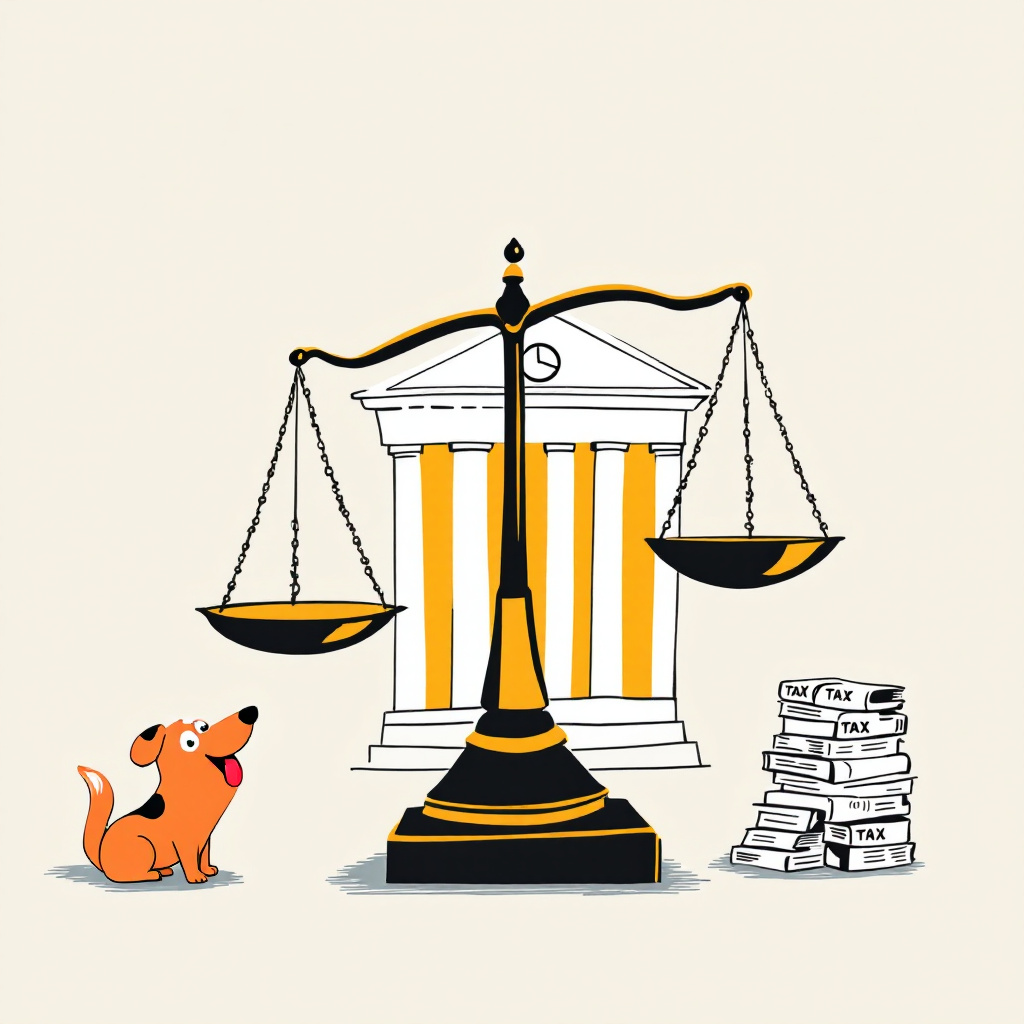Legal basis for dog tax: everything you need to know
Dogs are our best friends, loyal companions and often wonderful family members. But with this responsibility comes a number of legal obligations. One of the most well-known obligations for dog owners in Germany is the dog tax. Although some may find this tax a nuisance, it has its specific reasons and legal basis. Let's take a deeper look at the legal basis of the Dog tax and its various facets.
Why is there a dog tax?
The dog tax is more than just an annoying levy for pet owners. It has its origins in history, when it was first introduced in the 19th century. Back then, it was mainly used to reduce the number of stray dogs. Today, the tax is primarily intended to help cover the costs of cleaning dog faeces from municipal parks and pavements. In addition, the revenue often flows into the general budget of the municipalities.
- Control of the dog population
- Reduction of environmental pollution (e.g. dog faeces)
- Financing of urban projects

The legal basis of the dog tax
The legal basis for the dog tax is based on the municipal tax laws of the respective federal states. On the basis of these laws, cities and municipalities can set their own Dog tax statutes adopt. The reason for this lies in local self-government. In short, each municipality can decide for itself how high the tax is in its area and exactly how it is levied.
Interestingly, the dog tax falls under the category of so-called Expense taxes. In other words, it is levied as a tax on the possession of a "luxury good". Dogs are - surprisingly - considered a luxury in this context, which certainly causes some grief in the hearts of some dog owners.
Municipal differences: No standardised solution in sight!
You may have noticed that dog tax can vary from town to town. While some municipalities charge a flat rate for each dog, others may charge additional fees for certain breeds that are categorised as potentially dangerous. Which breed is considered dangerous can vary completely - a veritable jungle of regulations!
As a rule, German shepherds, Rottweilers and pit bulls are often the target of such additional fees. However, there are no standardised regulations: Each municipality has its own rules.
Rights and obligations of dog owners
As a dog owner, it is important to know the local dog tax statutes and ensure that the tax is paid correctly. But that's not all. Here are some important points that dog owners should keep in mind:
- Registration of the dog: As a rule, a dog must be registered with the city within one to two months of purchase.
- Cancellation: If the dog dies or the owner moves to another municipality, a corresponding deregistration is required.
- Tax classes: Depending on the number of dogs or the breed, different tax classes may apply.
- Use of the tax stamp: Many cities require dogs to wear the tax sticker visibly - on their collar, for example.
Exceptions and exemptions
It is possible to be exempt from dog tax in specific cases. There are many reasons for this and the regulations for this vary from municipality to municipality:
- Guide dogs for the blind and assistance dogs: These helpers on four paws are often exempt from tax.
- Dogs in animal welfare: Those who take dogs into care in order to place them later can often hope for an exemption.
- Specialised professions: Shepherds and dachshund breeders can apply for an exemption in some cases.
It is advisable to contact the local city council directly to find out what specific exemption options are available and what proof is required.
How do I deal with mistakes and misunderstandings?
It can happen: The dog tax is erroneously calculated too high or an application for exemption is rejected. What can you do? Don't panic, because there are various ways to resolve this:
- Submission of an objection: You can take action against misunderstandings or incorrect notifications in particular.
- Direct dialogue: It often helps to contact the relevant tax office directly and clarify the matter in person.
- Take advantage of legal advice: For legally complex issues, especially if it turns out to be a bone of contention with the municipality, it is advisable to consult a lawyer.
With the right knowledge and a cool head, most problems can often be solved in no time at all.
A look into the future of dog tax
The dog tax has long been an integral part of the municipal finance system and is likely to remain so in the future. Nevertheless, there are many discussions and debates about possible reforms. In larger cities in particular, the possibility of introducing digital solutions for registering and paying the tax is being considered time and again. Innovative approaches could help to make the process more efficient for dog owners and local authorities.
In a future world where everything is becoming more complex and efficient at the same time, one has to ask: will the dog tax continue to be an important part of the relationship between dog, owner and city? Only time will tell.
But for now, grab the lead, throw the tax stamp around your faithful four-legged friend's neck and enjoy a long walk together. Because one thing is certain: love for our dogs is non-negotiable!
FAQs on dog tax
Which law regulates the dog tax?
The dog tax is set out in the regulations of the municipal tax laws of the respective federal states. The standard tax is usually 90 euros per calendar year for each dog. Higher tax rates may apply to the keeping of dogs classified as dangerous, for example in accordance with Section 2 (1) to (3) of the Dogs Act of 26 January 2006 (HmbGVBl. p.).
Why do you have to pay dog tax in Germany?
In addition to financing communal expenditure, the dog tax also serves to keep the number of dogs at a tolerable level. The legal basis for levying the dog tax is the dog tax laws or the municipal tax laws of the federal states, which oblige or authorise the municipalities to levy the tax.
Is dog tax legal?
Yes, the dog tax is enshrined in law and is a compulsory tax for all dog owners who keep their dog privately. Failure to comply with this obligation by not paying the tax or failing to register the dog can be punished as an administrative offence.
What are the penalties for non-payment of dog tax?
Failure to fulfil the dog tax obligation can have legal consequences. These can range from fines to confiscation of the dog, depending on the severity and repeated offences. Local authorities can also levy the dog tax retrospectively.
Are there differences in the dog tax for different dog breeds?
Yes, in many municipalities there are higher taxes for certain breeds, especially those that are categorised as potentially dangerous. However, these regulations vary greatly from one municipality to another, so it is advisable to find out about the specific local regulations.
Author
-

David is a passionate aquarist with more than 20 years of experience in setting up and maintaining freshwater and saltwater aquariums. He specialises in the biodiversity of aquatic ecosystems, aquascaping and the species-appropriate keeping of aquarium fish. His articles on haustierewissen.de are a treasure trove for aquarium enthusiasts looking for sound advice and creative ideas for their underwater worlds.
View all posts




